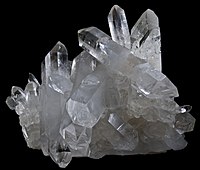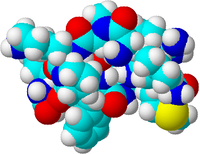
Effects of naringin on oxidative stress, inflammation, some reproductive parameters, and apoptosis in acrylamide‐induced testis toxicity in rat
Sign Up to like & getrecommendations! Published in 2023 at "Environmental Toxicology"
DOI: 10.1002/tox.23728
Abstract: Acrylamide (ACR) is used in many fields such as cosmetics, paper, and textile industries. It also occurs at very high temperatures in some foods. Gonadotoxic effects of ACR have been found in experimental animals. Many… read more here.
Keywords: testis toxicity; induced testis; oxidative stress; stress inflammation ... See more keywords

Enhancement of suppression oxidative stress and inflammation of quercetin by nano-decoration for ameliorating silica-induced pulmonary fibrosis.
Sign Up to like & getrecommendations! Published in 2023 at "Environmental toxicology"
DOI: 10.1002/tox.23781
Abstract: Silicosis is a life-threatening lung fibrotic disease caused by excessive inhalation of environmental exposure to crystalline silica-containing dust, whereas achieving therapeutic cures are constrained. Antioxidation and anti-inflammation are currently recognized as effective strategies to counteract… read more here.
Keywords: fibrosis; silica; oxidative stress; stress inflammation ... See more keywords

Agomelatine confers neuroprotection against cisplatin-induced hippocampal neurotoxicity
Sign Up to like & getrecommendations! Published in 2020 at "Metabolic Brain Disease"
DOI: 10.1007/s11011-020-00634-y
Abstract: Neurotoxicity caused by cisplatin is a major obstacle during chemotherapy. Oxidative stress and inflammation are considered the primary mechanism behind neuronal damage which affects the continuing chemotherapy regimen. Agomelatine was recently described as a neuroprotective… read more here.
Keywords: stress inflammation; cisplatin; neurotoxicity; cisplatin induced ... See more keywords

Neuroprotective effects of carvacrol against cadmium-induced neurotoxicity in rats: role of oxidative stress, inflammation and apoptosis.
Sign Up to like & getrecommendations! Published in 2022 at "Metabolic brain disease"
DOI: 10.1007/s11011-022-00945-2
Abstract: Cadmium (Cd), is a heavy metal reported to be associated with oxidative stress and inflammation. In this paper, we investigated the possible protective effects of carvacrol against Cd-induced neurotoxicity in rats. Adult male Sprague Dawley… read more here.
Keywords: effects carvacrol; oxidative stress; induced neurotoxicity; neurotoxicity ... See more keywords

Chicoric acid prevents methotrexate hepatotoxicity via attenuation of oxidative stress and inflammation and up-regulation of PPARγ and Nrf2/HO-1 signaling
Sign Up to like & getrecommendations! Published in 2020 at "Environmental Science and Pollution Research"
DOI: 10.1007/s11356-020-08557-y
Abstract: Chicoric acid (CA) is a natural antioxidant with promising hepatoprotective activity. We investigated the potential of CA to prevent methotrexate (MTX) hepatotoxicity, pointing to the role of Nrf2/HO-1 signaling and PPARγ. Rats received CA for… read more here.
Keywords: ppar; stress inflammation; chicoric acid; nrf2 signaling ... See more keywords

Exposure to fine particulate matter induces self-recovery and susceptibility of oxidative stress and inflammation in rat lungs
Sign Up to like & getrecommendations! Published in 2020 at "Environmental Science and Pollution Research"
DOI: 10.1007/s11356-020-10029-2
Abstract: PM 2.5 induces pulmonary inflammation via oxidative stress, and this role in the lungs is widely accepted, but studies on whether oxidative stress and inflammation can self-recover and be fully restored are limited. In this… read more here.
Keywords: recovery; rat lungs; stress inflammation; stress ... See more keywords

Metformin alleviates high glucose-induced ER stress and inflammation by inhibiting the interaction between caveolin1 and AMPKα in rat astrocytes.
Sign Up to like & getrecommendations! Published in 2020 at "Biochemical and biophysical research communications"
DOI: 10.1016/j.bbrc.2020.10.075
Abstract: Hyperglycemia-induced endoplasmic reticulum (ER) stress and inflammatory response afflict neuropathological diseases (such as epilepsy and Alzheimer's disease). Astrocytes are the critical cells that mediate brain inflammation in this process. Metformin is a kind of hypoglycemic… read more here.
Keywords: high glucose; stress inflammation; caveolin1 ampk; inflammation ... See more keywords

Apigenin and its methylglyoxal-adduct inhibit advanced glycation end products-induced oxidative stress and inflammation in endothelial cells.
Sign Up to like & getrecommendations! Published in 2019 at "Biochemical pharmacology"
DOI: 10.1016/j.bcp.2019.05.027
Abstract: Protein glycation in the body can lead to malfunction of intracellular and extracellular proteins. Reactive carbonyl species (RCS) have been identified to be key intermediates in the reactions. The reaction products, generally termed as advanced… read more here.
Keywords: advanced glycation; stress inflammation; induced oxidative; oxidative stress ... See more keywords

Diphenyl diselenide ameliorates diabetic nephropathy in streptozotocin-induced diabetic rats via suppressing oxidative stress and inflammation.
Sign Up to like & getrecommendations! Published in 2021 at "Chemico-biological interactions"
DOI: 10.1016/j.cbi.2021.109427
Abstract: Oxidative stress and inflammation are implicated in the occurrence and progression of diabetic nephropathy (DN). Diphenyl diselenide (DPDS) is a stable and simple diaryl diselenide with anti-hyperglycemic, anti-inflammatory, and antioxidant activities. However, the effects of… read more here.
Keywords: diphenyl diselenide; stress inflammation; stress; diabetic nephropathy ... See more keywords

Chicken thalamic injury induced by copper (II) or / and arsenite exposure involves oxidative stress and inflammation-induced apoptosis.
Sign Up to like & getrecommendations! Published in 2020 at "Ecotoxicology and environmental safety"
DOI: 10.1016/j.ecoenv.2020.110554
Abstract: Copper (Cu) is a toxic substance of heavy metals, and arsenic (As) is a toxic substance of metalloids. They all cause oxidative stress and have been widely studied in recent years. Studies have reported that… read more here.
Keywords: apoptosis; stress inflammation; inflammation; stress ... See more keywords

Oxidative stress, inflammation and mild cognitive impairment
Sign Up to like & getrecommendations! Published in 2017 at "European Psychiatry"
DOI: 10.1016/j.eurpsy.2017.01.1370
Abstract: Introduction Oxidative stress (OS) and inflammation are processes known to be implicated in neurodegeneration. Moreover, risk factors for dementia (depression, obesity, sedentary lifestyle, diabetes, etc.) are associated with up-regulation of pro-inflammatory cytokines. OS has been… read more here.
Keywords: associations inflammation; stress inflammation; inflammation; pro inflammatory ... See more keywords